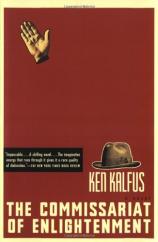Reading Group Guide
Discussion Questions
The Commissariat of Enlightenment

1. Beginnings and endings in literary works are significant. Let's look at how this book begins. Three men on a train get jolted. Look at each element. Why a train? Why three men? How does each one react? What does this first paragraph reveal about the rest of the novel?
2. Some of the events in this novel actually happened. Some events could have happened. Some could happen only in the realm of the imagination. Which events are real history? Which are fantastical?
3. If a photo, film, or videotape is represented as being of a real event, we tend to believe what we see. But Gribsin says, "Deceit was ingrained in cinematographic reporting, as it was in every kind of storytelling." How does Gribshin, who works for a newsreel company, falsify reporting with his camera? What famous photo, film, or TV broadcast has shaped your own "eyewitness" to history? Are contemporary television news images free of deceit? Have you ever felt yourself being manipulated by a TV news program, yet unable to shake off its enduring images? What are the differences between propaganda in dictatorship and propaganda in a free country?
4. Shakespeare said, "What's in a name?" For Russian revolutionaries (and actors, of course) evidently a great deal. Many Russian leaders, i.e., Stalin and Lenin, changed their names, as did the novel's protagonist Gribshin. Why do you think Gribshin chose Astapov? What are some motives to change one's name? Think of celebrities with one-word names -- what kind of effect does this have on their image?
5. Discuss Gribshin. What is his background? What are his ideals? Is he a good person? What are his moral failings? What kind of relationships does he have? Does he change over the course of the novel?
6. The sketch of Tolstoy that Khaitover wants to put on a tea tin, the religious icons in the Russian home and church, and Lenin's body on display -- what do these things have in common? What images, or symbols, are immediately recognizable throughout the world today and what do they reveal about our values? We learn of Khaitover's eventual triumph toward the end of the novel. What image does he finally succeed in making a worldwide commodity?
7. In the novel, when Astapov stops Levin's play, he thinks: "For a revolution to be victorious, to change the manner of human thought, it would have to make sense out of history's disorder. Enlightenment's principal task was to create the story, this monument to the future. A steady hand would carve it from the misshapen, stupid stone of Russian culture, specifically its myth, religion, and folk wisdom." Do you believe that culture shapes our icons, or that icons shape our culture? As The Commissariat of Enlightenment, Astopov's answer would be the latter. Are there Commissariats of Enlightenment in today's world? What kind of society are they trying to shape?
8. Why do you think Yelena made her film "for women's education"? What does Astapov consider so dangerous or wrong about her film? How is it in opposition to the films he makes? Whose kind of films are made by Hollywood today? Where might you see a Yelena-like film?
9. Dr. Vorobev and his embalming discovery are perhaps the most macabre and fantastical elements in the novel. Or are they? Lenin was preserved and displayed in real life. What was the purpose of doing so?
10. The final pages of the novel are told from Lenin's point of view -- after he's pronounced dead. Did the embalming process make his death incomplete? If he appears alive, is he in some respects living? If we can see someone sing, dance, or talk on film after they are dead, does the film blur the distinction between life and death? What is the impact of this psychologically?
11. This novel can be called "a novel of ideas." If you had to pick just one major idea, what you think is the most important "point" of the novel, what would it be?
The Commissariat of Enlightenment
- Publication Date: February 3, 2004
- Paperback: 304 pages
- Publisher: Harper Perennial
- ISBN-10: 0060501391
- ISBN-13: 9780060501396








